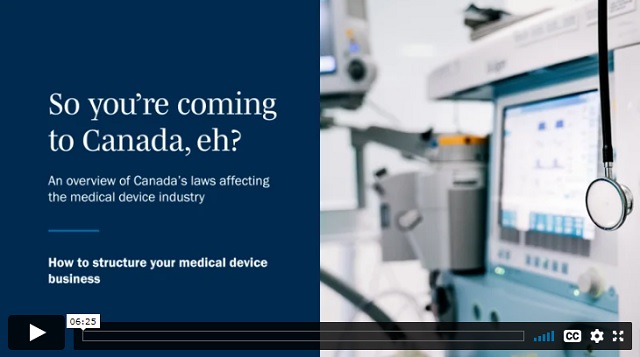- with readers working within the Oil & Gas and Law Firm industries
- within Insolvency/Bankruptcy/Re-Structuring topic(s)
- with Senior Company Executives, HR and Finance and Tax Executives
A successful business needs a solid foundation, particularly in a highly sophisticated market such as medical devices. What is the best way to set up your medical device company so that you can confidently do business in Canada?
Cheryl Reicin, Teresa Reguly and Grant Worden share key insights, including:
- the different business models for selling medical devices in Canada
- if a business needs to be incorporated within Canada to sell medical devices
- tax and employment considerations
Click here to see other videos and webinars in this series.
Video transcript
Grant Worden (00:07): Hello and welcome to the next installment of Torys' eight-part medical device series: "So you're coming to Canada, eh? An overview of Canada's laws affecting the medical device industry. My name is Grant Worden. I'm a Partner in Torys' Litigation Department and the firm's Product Liability Practice Chair. I'm joined today by Cheryl Reicin and Teresa Reguly, who will be speaking about how to structure your medical device business in Canada. Teresa, let me start with you. What does a company wishing to sell medical devices in Canada need to consider as a first step?
Teresa Reguly (00:40): First thing I would consider is, what is the classification of your medical device? So it could be a Class I, a low-risk device, or it could be a Class II, III, IV higher-risk class. The reason I say that is, depending on the class of device you're selling, you're going to need a different type of licence from Health Canada. The other thing you want to think about is, where are you selling this device? So am I selling it to hospitals for use within the hospital? Am I selling it to physicians for use in a clinical setting or my selling it at retail? And the patient consumer is going to purchase it and use it at home. So depending on the answers to those questions, there's going to be different licencing considerations from the Health Canada perspective that you'll have to work through.
Grant Worden (01:27): And does a company that's wishing to sell medical devices in Canada need to have a physical presence in Canada?
Teresa Reguly (01:33): No, not necessarily. Again, it depends on what your overall marketing strategy is. So if I'm the manufacturer of a Class II, III or IV medical device, and when I say manufacturer, I mean my name is on the label and, you know, I'm the one putting the product out there. If I'm that individual, I can sell directly to certain customers in Canada, those certain customers being a retail store or a hospital setting.If you have a lower class of device, so Class I device, again, you can sell direct to certain customers, but there's a different licencing regime and obligations associated with it. So that's something you'll want to work through. If you actually want to work with a distributor, so you don't want to be responsible for the actual sales and distribution within Canada, then you might want to set up a company in Canada to do that, as Cheryl will speak to shortly. Or you can find a third party that already has the proper licencing from Health Canada and work through that third-party distributor.
Grant Worden (02:35): Thanks, Teresa. Cheryl, given what we've heard from Teresa, in what circumstances would a company wish to set up a physical presence in Canada?
Cheryl Reicin (02:42): If they have an office here and if they have employees, you'll want to set up either a company or have a branch. Generally, in most cases we find that a company, a corporation, is more appropriate. There are also certain tax benefits to setting up a company here, especially if your company is doing research and development in Canada and depending on how many employees you have. There's also substantial tax advantages to having your IP. I'm talking about worldwide IP. In Canada, held by Canadian subsidiary as opposed to a US company. And those advantages are becoming more and more pronounced. Of course, every company's circumstances are different and need to be evaluated individually. It's not one size fits all, but in general, if structured correctly, a company can avail itself of significant benefits and incentives by locating a corporation in Canada.
Grant Worden (03:50): Cheryl, what else should a company incorporating in Canada consider?
Cheryl Reicin (03:54): The fact of the matter is that companies in Canada, particularly those incorporated in Ontario and certain other provinces, are very similar in terms of governance to Delaware companies, and they're getting even more similar. For instance, there's no longer a requirement for Ontario, B.C. or Nova Scotia companies to have Canadian directors. This is intentional because Canada wants more investment from US investors and is trying to make investors feel more comfortable.
Grant Worden (04:28): Are there any other considerations?
Cheryl Reicin (04:30): Yes. Certain provinces have special tax rates for foreign employees and for Canadian expats returning to Canada, such as in the province of Québec. French language laws in the province of Québec that need to be considered, and there's been recent amendments to those laws. Companies will be delighted to know that Canadian health care is socialized in the burden of health costs on companies is substantially less than in the US. But also, employees have rights that outpace those in the US, such as enhanced termination rights, and extended maternity and paternity leaves.
Grant Worden (05:14): Teresa, let's talk about advertising. Is it permissible to advertise medical devices directly to the public in Canada?
Teresa Reguly (05:21): Yeah, it's a really good question, Grant. Some of our viewers might know that prescription drug advertising is quite restrictive in Canada, those rules don't apply to medical devices. So you do have much more flexibility if you want to advertise direct to the public for medical device products. There are certain restrictions, so you can't advertise medical devices or any product as cure or treatment for certain diseases. So think cancer, heart disease, kind of the big ones. But outside of that, there's a lot of flexibility in the way you market your product to the public. And of course, you can always market to health care professionals as well in Canada as you would in other jurisdictions. So this should all go into your marketing plan and deciding how best to run your business. When you do take the leap and come to Canada.
Grant Worden (06:07): Thank Teresa, and thanks Cheryl. And thanks for joining us today. We hope you'll join us for our next installment of our eight-part medical device series, "So you're coming to Canada, eh? An overview of Canada's laws affecting the medical device industry."
The content of this article is intended to provide a general guide to the subject matter. Specialist advice should be sought about your specific circumstances.



